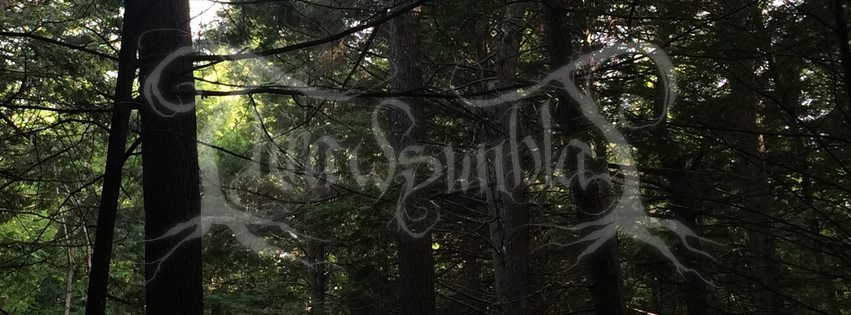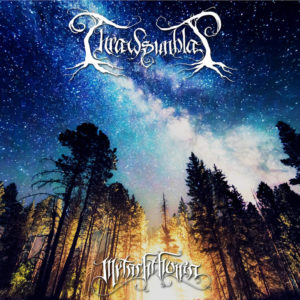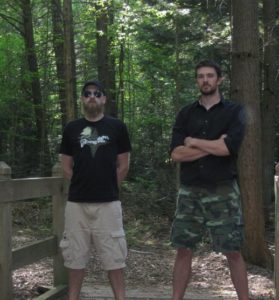Joel and I have been trying to get this interview happen for some time now and we finally got it locked down. Read on, to hear Joel tell you the correct way to say the band name, what it was like to work with David from Woods of Ypres, Siegfried Meier and the meaning of Metachthonia.
* I’ve always been a fan of your guitar playing – how long have you been playing guitar and how did you get into metal?
Thanks for the kind words! I’ve been playing guitar since I was fourteen-ish. Had listened to all the 80’s Metallica at this point, but really well and truly got into metal when I downloaded the guitar pro tab for Lake Bodom.
* What are your thoughts on Black Metal in 2017?
Alive and strong. Some great atmospheric stuff coming from all corners of the globe. Definitely different from its origins in the 90’s. Now it seems less political and less extreme than it did at first—I think we’re just accustomed to it and its harshness. Those seeking harshness find it and are at home there. I feel like today it’s less of a medium for political expression and rebellion than it once was, and more a canvas. Black metal allows one to express a multitude of dark wondrous sonic atmospheres, the sort of wide and spacious atmospheres that heavy and complex lyric matter can float through endlessly. It seems a great medium for that at the moment.
* Canada has produced some great black metal bands over the years (Sortilegia, A.M.S.G, etc) – what do you think the uniquely Canadian “spin” on black metal is say compared to Scandinavian, French or American black metal?
I really couldn’t pin down a specific Canadian sound. I think that Canada, because it’s so geographically vast and demographically sparse in relation, has many, many pockets of sound, a state of affairs which makes it really difficult for a genre or spin to emerge. The result of this, however, is that I think Canada has something which no other place has, and that’s this ability to house many, many genres — all of which done with authenticity — under one national umbrella. A lot of the Prairie and West Coast bands like Manitoba’s Wilt, for example, have a Cascadian black metal flavour, a very dense atmospheric take on it, but the lyric matter of which is uniquely Canadian. Quebec’s Catuvolcus had this ferocity and unwavering Gaulish richness to their music and lyrics, which is a sound evocative of Europe’s alpine countries. Quebec’s Forteresse have qualities of the harsher French sound. But it all manages to feel Canadian.
The first thing about black metal is that for it to be listenable it must of course be genuine. I think the Canadian sound is unique in that, as a country with so many tremendous threads of heritage, it can credibly ally with so many different flavours of black metal.
* Didn’t David Gold come up with your band name? How do you pronounce in and what does it mean? I know people today who have problems pronouncing Ypres (EE PRAY)
Now that you mention it, I think there is something alluring about the unpronounceable. Some mystery to it. Maybe it’s just new words, which is the realm of the unpronounceables, I suppose, but it allows the listener to apply their own intuition and taste to it. I’ve heard Thrawsunbl-AT, Thrawsunbl-AHT, Thraw-SUN-blaht. To each their own. I’ve heard Ensif-EAR-um and EnSIFerum, and the half the fun is the mystery. The origin of the Thrawsunblat name, however, is that when David and I were coming up with it, he suggested a word like this huge Germanic dude laughing, slamming a stein of beer on the table and shouting, “Thraws und blaaaaat ah hah hahhh!” which was perfectly pertinent to us, a pair of Canadians with our thrash and blast, who no matter what our output were necessarily and inherently making a sort of bastardized version of northern European metal.
* Can you help me figure out the timeline – where you already doing Thrawsunblat before you played in Woods of Ypres? And if so how did you come to join WOP?
Sure. I bought Pursuit of the Sun from Dave via his mail order business in 2005. After that we kept in contact via mail and I mailed him two or three demos over the years. In 2009 I sent him one he particularly liked (Black Sky) and he said “Hey Joel! Want me to drum on an album for you?!” Which was a jaw-dropping moment for young me, of course. We recorded an album that year, which became Canada 2010. Then the next year in 2010, Woods was touring and needed a lead guitar player. Dave asked me to join. It was sort of like Dave Grohl asking me to join the Foo Fighters, so I jumped on board. Thrawsunblat went on hold for a bit, though I would write Thrawsunblat lyrics on the road with Woods. It wasn’t until after David and I wrote and recorded Woods 5 in 2011, that I was able to give Thrawsunblat attention and energy, at which point I went straight into writing mode for Thrawsunblat II: Wanderer on the Continent of Saplings.
* You worked with Siegfried Meier on Woods of Ypres “Grey Skies and Electric Light” it must have been a weird experience to work with him again or?
Not even remotely weird. Metachthonia was our second time working together since Woods 5. We’d chatted a lot after David’s passing and really were sources of healing and restoration for one another during that time. Working together after on Thrawsunblat’s second album, Wanderer on the Continent of Saplings was a seamless process. Then for Metachthonia—by now we’ve gotten to know quite well how the other works, and Sig is just so damned good at what he does and is such a kind, quick to laugh gent that it really is a pleasure through and through working with him.
* How do you feel the production of this album differs from your previous releases?
Metachthonia is intentionally different from the others — it’s a revisiting of the black metal landscape of the first album, Canada 2010, but in a different headspace. If the albums were spectrums of colour, Metachthonia would feature less of Canada 2010’s greens, and more rich blues, browns, and blacks. With the cellos and the overarching lyric themes, Metachthonia is darker, more refined, and more specific in its production. I think with the longer, more immersive songs, it’s more somber and reflective in some points, and louder and harsher in others, all with a wider array of atmospheres. Metachthonia is of course quite organic – the colour and texture of a bonfire.
* Your album that came out this year, Metachthonia – most of the songs seem very “get back to nature” is this a theme that you are focusing on for this album or is it something that you are aiming to do as a lifestyle? (example the Wolves in the Throne room guys all live on a rural compound together)
An album of course – at least for me – is a compendium of all the things a person ponders and wonders and explores and tries to solve throughout the course of a year or two. The things I found most dissatisfying were the ones involving what felt like the slow dissolution of my connection to the outdoors. While the lyrics may seem a rally cry for others, of course the album is almost necessarily a rally call even more for myself.
* How do you craft your songs? start with a riff ? a drum pattern? a mood you want to convey? please explain
It is always different for me. Maritime Shores and Goose River started off as lyrics, as did Once Fireveined. Most of the Canada 2010 album started out as music. If it starts with music, then music itself usually originates from me exploring a certain mode, mood, or atmosphere – then I just stay there and write. A riff will happen and, if I’m lucky, then sometimes the rest of the song is just a sort of “well it obviously has to go like this”, and then rest of the song almost becomes more of data entry than of creation. That’s when it’s easy. When it’s not easy, it usually involves sitting in a room and playing a riff, then changing it here and there and playing it until it’s no longer boring. Then finding another non-boring riff for the next section. After that comes bouncing the demo to mp3 and walking around outdoors listening. It’s an exercise in hearing a song fresh and in listening to the momentum of a song, noting when the demo goes in a different direction from how it could or should. Then adding the edits to a new demo. Sometimes I entirely forget about songs, dig them up two years later and put them on an album.
Which actually brings me to the drum pattern you mentioned. This six-song album was, after five songs, in a state I considered complete. But after listening to it for a little while, I wasn’t happy with the first section of Hypochthonic Remnants—which was one of these songs I’d dug up after about five years and put on an album. So I scrapped the first section and using the same drum pattern rewrote it, which then of course didn’t meld with the second section. So I wrote a new second section, which of course didn’t mesh with the final part, so I rewrote that too. So there I was with ten new minutes of music, only having intended to rework the first minute of an old tune. But that’s the how Dead of Winter was written—completely from scratch when I was unhappy with the first section of Hypochthonic Remnants. I of course then re-rewrote the first third of that, and this time it fit.
* My understanding is the title Metachthonia means like the end of this world? This civilization? Is that right? If not what do you see it standing as?
Not the end of the world, at all. It’s this modern age. It’s us, here. Now. It’s a time unique and entirely different to any other age. To discuss a thing, it helps to name it.
And Metachthonia is my way of discussing us, here, now as an entity – what problems exist now that once didn’t, what our daily routines say about us as a culture, how we navigate all this new electronic noise, its effect on us in our endeavour to find happiness and meaning in this wild new world we’re all thrust into.
* Have you done much touring as Thrawsunblat? and if not why not? Any plans to bring the band on full tours? or just one off type events and festivals?
We still haven’t played a live show! Though I play Black Sky, Maritime Shores, and Goose River all the time with the acoustic band I started in town called Oak, Ash, and Thorn. Would love to do some events and festivals with Thrawsunblat, but it’s difficult being in North America, what with the huge distances between cities. We’re working on it though.
* I just ordered your vinyl from Broken Limb Recordings today – how did that deal come about? (the vinyl looks amazing BTW)
Thanks! Glad you dig! The vinyl came about because Rae was working with Broken Limbs Recordings for her own project, Immortal Bird. Pete from BLR, who liked the album, wondered if we’d be interested in putting it out on vinyl, which took very little deliberating on our part.
* What future plans do you have for the band?
More albums! Got the rough idea for the next two albums planned out. With Metachthonia, we’ve just done our long-song album, so for Thrawsunblat 4 we’ll probably go back to something more or less a cross between Canada 2010 and Wanderer in terms of song length and riff style. I had a lot of ideas for Metachthonia which weren’t somber or atmospheric enough, but which will have a warm home on the next record.
* Any final words or shout outs?
Big thanks to everyone for their support, for listening and spreading the word! Thrawsunhats will be available soon! Going to pick them up today, actually!



